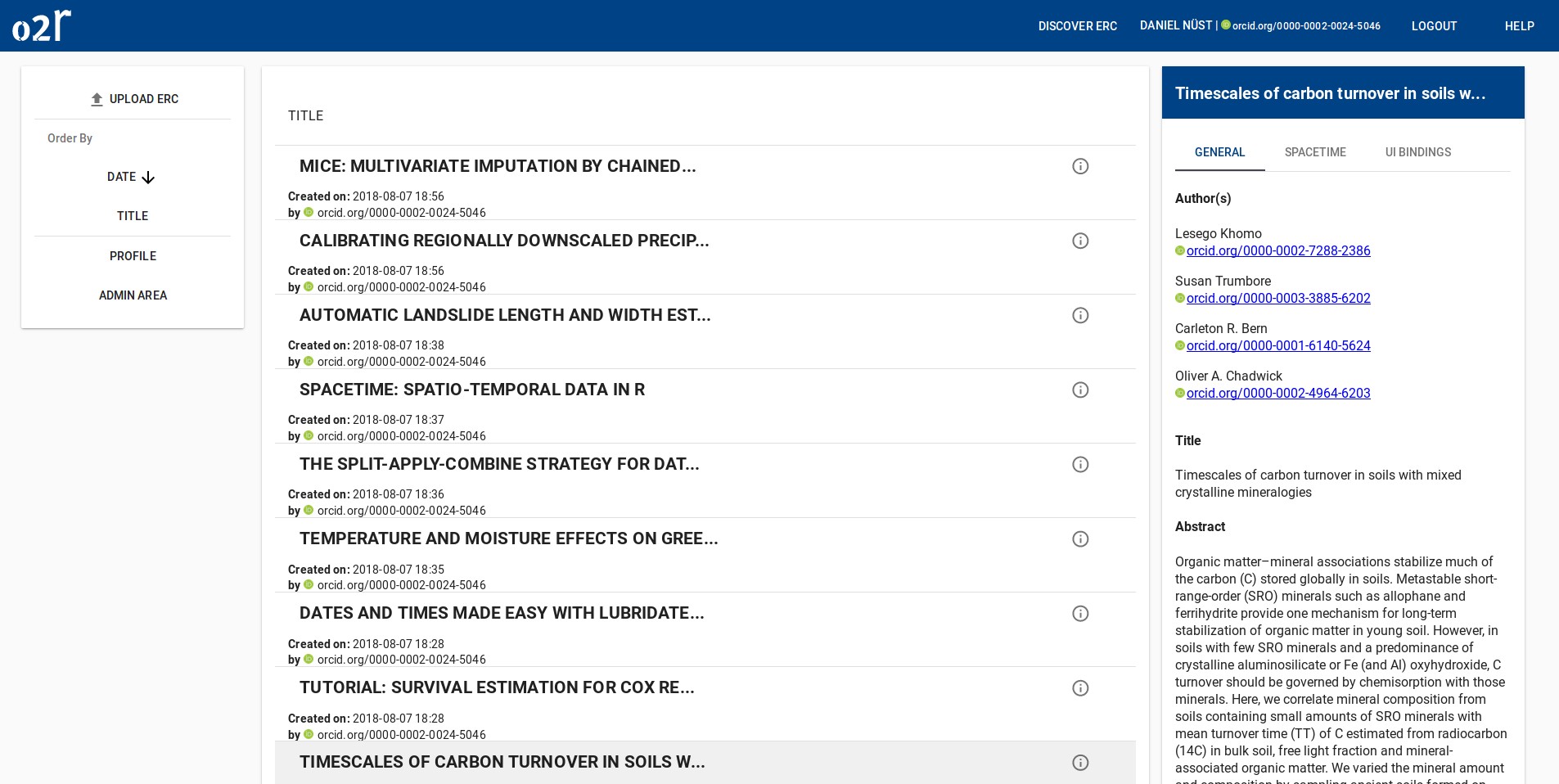14 Aug 2018 | Daniel Nüst
We’ve been working on demonstrating our reference-implementation during spring an managed to create a number of example workspaces.
We now decided to publish these workspaces on our demo server.

Screenshot 1: o2r reference implementation listing of published Executable Research Compendia. The right-hand side shows a metadata summary including original authors.
The papers were originally published in…
read more…
13 Jul 2018 | Daniel Nüst
Today a new journal article lead by o2r team member Daniel was published in the journal PeerJ:
 Reproducible research and GIScience: an evaluation using AGILE conference papers by Daniel Nüst, Carlos Granell, Barbara Hofer, Markus Konkol, Frank O. Ostermann, Rusne Sileryte, Valentina Cerutti
Reproducible research and GIScience: an evaluation using AGILE conference papers by Daniel Nüst, Carlos Granell, Barbara Hofer, Markus Konkol, Frank O. Ostermann, Rusne Sileryte, Valentina Cerutti
PeerJ. 2018.doi: 10.7717/peerj.5072
The article is an outcome of a collaboration around the AGILE conference, see https://o2r.info/reproducible-agile/ for more information.
Please retweet and spread the word!
Your questions & feedback are most welcome.
Here is Daniel’s attempt at a non-specialist summary:
More and more research use data and algorithms to answer a question.
That makes it harder for researchers to understand a scientific publication, because you need more than just the text to understand what is really going on.
You need the software and the data to be able to tell if everything is done correctly, and to be able to re-use new and exciting methods.
We took a look at the existing guides for such research and created our own criteria for research in sciences using environmental observations and maps.
We used the criteria to test how reproducible a set of papers from the AGILE conference actually are.
The conference is quite established and the papers are of high quality because they were all suggested for the “best paper” awards at the conference.
The results are quite bad!
We could not re-create any of the analyses.
Then we asked the authors of the papers we evaluated if they had considered that someone else might want to re-do their work.
While they all think the idea is great, many said they do not have the time for it.
The only way for researchers to have the time and resources to work in a way that is transparent to others and reusable openly is either to convince them of the importance or to force them.
We came up with a list of suggestions to publishers and scientific conference organisers to create enough reasons for researchers to publish science in a re-creatable way.
21 Jun 2018 | Daniel Nüst
Last week o2r team member Daniel co-organised a workshop at the 21st AGILE International Conference on Geographic Information Science in Lund, Sweden.
The workshop went very well and Daniel together with his colleagues was able to spread the word about reproducible research and Open Science.
They are pretty sure they convinced some new scientists to reconsider their habits!
Daniel wrote a short report about the workshop: https://o2r.info/reproducible-agile/2018/#workshop-report
The workshop series will probably be continued at the next AGILE conference in Limassol, Cyprus.
For o2r participating in such a workshop is a great way to stay in touch with users of reproducibility tools and practices, and to give back to the communities not only with technology but with education.
18 Apr 2018 | Daniel Nüst
Last week EGU General Assembly (GA) 2018 took place in Vienna, Austria, and it was packed with interesting sessions and inspiring presentations.
The o2r team humbly tried to contribute to a massive conference: 15075 participants from 106 countries gave 17323 presentations in 666 sessions (it’s been reported the programme committee briefly discussed adding a session…), taught 68 short courses, and collaborated in 294 side events.
Let’s go through the events with o2r participation in chronological order.

Image courtesy of EGU website.
On Monday, Daniel joined the first ever…
read more…
27 Feb 2018 | Daniel Nüst
o2r Team member Daniel was invited by the university’s press office to participate in a series of interviews and articles on digitisation or “digitalisation” at the WWU Münster:
The video is now available online in German (embedded below) and with English subtitles.
You can also watch it on Facebook or in the WWU video portal.
Daniel wrote a brief summary for our blog and shares his experience:
Interview summary
First we talked about how digitisation is a familiar topic for computer scientists professionally (digital data, algorithms), but also something we encounter as citizens.…
read more…




